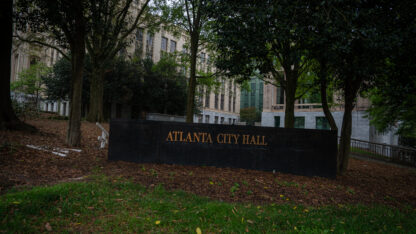
Fifty years ago this month, the United States Supreme Court issued a landmark decision that put real teeth into Civil Rights Act of 1964.Broadcast Version
The Heart of Atlanta Motel sat in the 200 block of Courtland Street. Back then, you could easily see the site from the highway. It boasted two full size swimming pools, a restaurant and lounge, air conditioning, and room service, all upscale amenities for the time. One thing it did not offer was accommodations for African-Americans.
The motel was one of several Atlanta businesses targeted for integration efforts in 1963 and 1964. Several people, including now-Congressman John Lewis, were arrested in early 1964 trying to eat at the motel restaurant.
Xernona Clayton remembers organizing a luncheon at the motel on behalf of Dr. Martin Luther King, Jr. In her words, it did not go well. “And Dr. King’s question was, ‘What seems to be the problem?’” said Clayton. “And the manager said, ‘Well frankly, we don’t like it because you bring people here to eat, and they’re black and whites together. And we don’t like that. And frankly, we don’t want your business.’”
In July 1964, President Lyndon Johnson signed the Civil Rights Act. Almost immediately, the motel’s owner, Moreton Rolleston — who was also a lawyer — filed suit.
According to Prof. Dan Coenen, who holds the Harmon W. Caldwell Chair in Constitutional Law at the University of Georgia, it was inevitable that a case testing the Civil Rights Act would make its way to the U.S. Supreme Court. The debates in Congress before the Act was passed was marked by arguments over whether the Act was constitutional.
Rolleston argued his own case all the way to the U.S. Supreme Court. “He said that the Civil Rights Act deprived him of his Fifth Amendment rights in that it took away his property without due process or his value,” said Cliff Kuhn, Associate Professor of History at Georgia State University. “And he also interestingly cited 13th Amendment, and the 13th Amendment was the amendment that abolished slavery. And he said that he was now being put into involuntary servitude by the Civil Rights Act. And so he actually, ironically, drew upon the 13th Amendment which was passed at the end of the Civil War.”
The justices ruled unanimously against Rolleston in December 1964. The motel had already been under court order to accommodate African-Americans while the case was decided. Rolleston admitted he had not lost any business because of integration, but he stood by his argument, making a statement for the television cameras right after the decision came down.
In part, Rolleston’s statement said, “This decision nullifies the rights and principals which the Constitution was designed to perpetuate. This decision opens the frightful door to the unlimited power of a centralized government in Washington in which the individual citizen and his personal liberty are of no importance. This is a sad day for the cause of individual freedom.”
Rolleston sold the Heart of Atlanta Motel in the 1970s. He died in 2013. The Atlanta Hilton now sits on the Courtland Street site.

9(MDAxODM0MDY4MDEyMTY4NDA3MzI3YjkzMw004))








